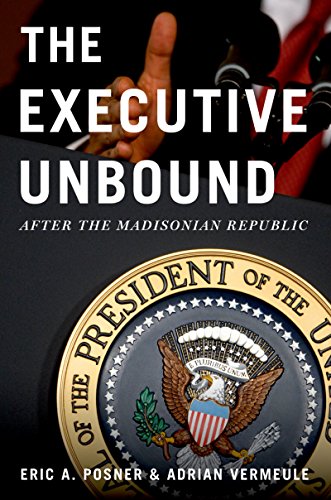
| Judul | Executive Unbound : After the Madisonian Republic / Eric A. Posner, Adrian Vermeule |
| Pengarang | Posner, Eric A. Vermeule, Adrian |
| Penerbitan | New York : Oxford University Press, 2010 |
| Deskripsi Fisik | 249 p. ;25 cm |
| ISBN | 9780199765331 |
| Subjek | Executive power--United States. |
| Abstrak | Ever since Arthur M. Schlesinger Jr. used “imperial presidency” as a book title, the term has become central to the debate about the balance of power in the U.S. government. Since the presidency of George W. Bush, when advocates of executive power gained ascendancy, the argument has blazed hotter than ever. Many argue that the Constitution itself is in grave danger. What is to be done? The answer, according to this book, is nothing. The book challenges conventional wisdom, arguing that a strong presidency is inevitable in the modern world. It is noted that most scholars object to today's level of executive power because it varies so dramatically from the vision of the framers of the Constitution. But the book finds fault with James Madison's premises. Like an ideal market, Madison's separation of powers has no central director, but it lacks the price system which gives an economy its structure; there is nothing in checks and balances that intrinsically generates order or promotes positive arrangements. In fact, the greater complexity of the modern world produces a concentration of power, particularly in the White House. The book charts the rise of executive authority, noting that among strong presidents only Richard Nixon has come in for severe criticism, leading to legislation which was designed to limit the presidency, yet which failed to do so. Political, cultural and social restraints, it is argued, have been more effective in preventing dictatorship than any law. The executive-centered state tends to generate political checks that substitute for the legal checks of the Madisonian constitution. |
| Bahasa | Indonesia |
| Bentuk Karya | Bukan fiksi atau tidak didefinisikan |
| Target Pembaca | Umum |
| No Barcode | No. Panggil | Akses | Lokasi | Ketersediaan |
|---|---|---|---|---|
| 00000026982 | 342.73 POS e | Dapat dipinjam | Perpustakaan Lantai 3 - Mahkamah Konstitusi RI | Tersedia
pesan |
| Tag | Ind1 | Ind2 | Isi |
| 001 | INLIS000000000010593 | ||
| 005 | 20220609102542 | ||
| 007 | ta | ||
| 008 | 220609################g##########0#ind## | ||
| 020 | # | # | $a 9780199765331 |
| 035 | # | # | $a 0010-0622000064 |
| 082 | # | # | $a 342.73 |
| 084 | # | # | $a 342.73 POS e |
| 100 | 0 | # | $a Posner, Eric A. |
| 245 | 1 | 4 | $a Executive Unbound : $b After the Madisonian Republic /$c Eric A. Posner, Adrian Vermeule |
| 260 | # | # | $a New York :$b Oxford University Press,$c 2010 |
| 300 | # | # | $a 249 p. ; $c 25 cm |
| 520 | # | # | $a Ever since Arthur M. Schlesinger Jr. used “imperial presidency” as a book title, the term has become central to the debate about the balance of power in the U.S. government. Since the presidency of George W. Bush, when advocates of executive power gained ascendancy, the argument has blazed hotter than ever. Many argue that the Constitution itself is in grave danger. What is to be done? The answer, according to this book, is nothing. The book challenges conventional wisdom, arguing that a strong presidency is inevitable in the modern world. It is noted that most scholars object to today's level of executive power because it varies so dramatically from the vision of the framers of the Constitution. But the book finds fault with James Madison's premises. Like an ideal market, Madison's separation of powers has no central director, but it lacks the price system which gives an economy its structure; there is nothing in checks and balances that intrinsically generates order or promotes positive arrangements. In fact, the greater complexity of the modern world produces a concentration of power, particularly in the White House. The book charts the rise of executive authority, noting that among strong presidents only Richard Nixon has come in for severe criticism, leading to legislation which was designed to limit the presidency, yet which failed to do so. Political, cultural and social restraints, it is argued, have been more effective in preventing dictatorship than any law. The executive-centered state tends to generate political checks that substitute for the legal checks of the Madisonian constitution. |
| 600 | # | 4 | $a Executive power--United States. |
| 700 | 0 | # | $a Vermeule, Adrian |
| 990 | # | # | $a 26982/MKRI-P/VI-2022 |
Content Unduh katalog